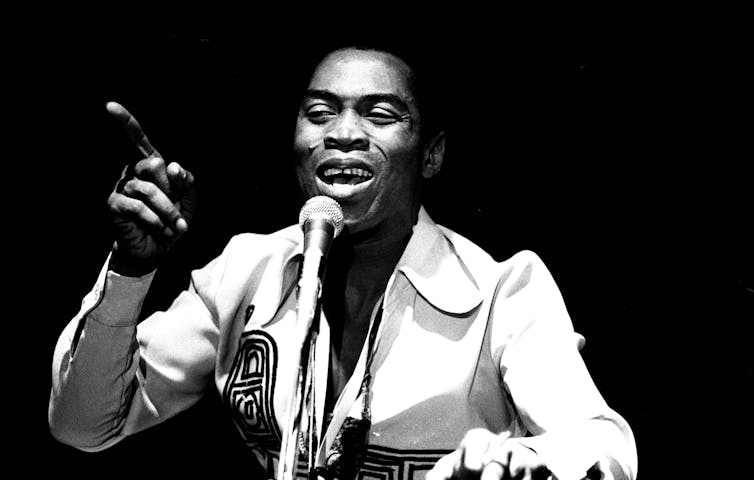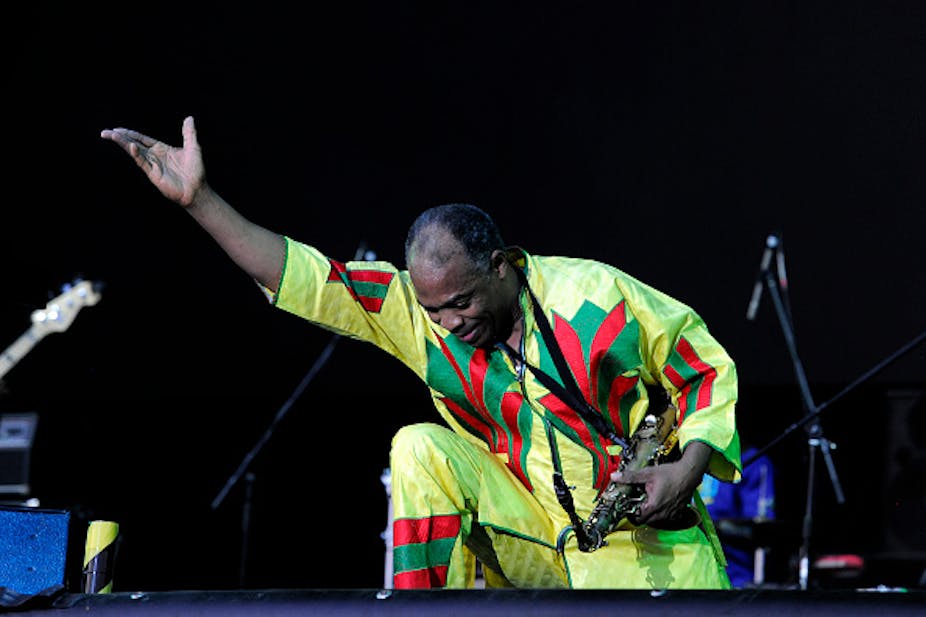It’s nearly a quarter of a century since Fela Kuti passed away. Yet, the influence of his music and pan-Africanist thoughts hasn’t stopped. Fela was notorious for the deployment of his Afrobeat as a critical tool against human rights violations, social injustice and insensitive cum inept leadership in Africa. And the conversation as to who best fits the profile of a successor has continued unabated.
Many Nigerian artists have gone as far as naming themselves as the reincarnation of Fela. From Dede Mabiaku’s endless references to his closeness to the Abami Eda – the name Fela gave himself – a Yoruba phrase that roughly translates to “the strange one” – and Chief Priest, to Charles ‘Charly Boy’ Oputa’s antics, a few have pretended to be made of the sort of defiant stuff at Fela’s core.
Musically, Eedris Abdulkareem’s success with the 2004 hit ‘Jaga Jaga’ appeared to have instigated a Fela complex in him to the point that he got Fela’s eldest son Femi Kuti’s saxophone support to legitimise his tribute in the single titled ‘Fela’ (2013).
There have been several other musical tributes to the memory of Fela. These have included Seyi Sodimu’s remarkable ‘Fela the King’ (2002) and W4’s rather cheesy ‘Like fada, Like son’ (2012). Beyond these, pop-inclined artistes have sought to appropriate different features of the great musician’s legacy. This has included drawing from the rich repertoire of Fela’s ensemble in embellishing their works, particularly over the last decade.
Yet, undoubtedly the most powerful of the tributes to Fela is ‘’97’ (2001) which was recorded and performed by Femi Kuti, himself an accomplished Afrobeat star.
A great deal of work has been done on protest music in Nigeria. But, in my view, studies have been reticent in appreciating the works of Femi.
I set about to fill this gap. In my study, I look at Femi’s music through the framework of a re-democratised Nigeria and I invariably draw equivalents with Fela’s works which constituted a major alternative voice through military-ruled Nigeria.
I conclude that, to source for a Fela successor outside the direct lineage of his family is to court the ridiculous – that is if there is any need to source for a Fela successor to begin with.
Protest music under military rule
Previous research showed that Femi’s consciousness through art had begun during military dictatorship in Nigeria. Songs like ‘Wonder Wonder’ (1995), ‘Plenty Nonsense’ (1995), ‘Nawa’ (1995), ‘Stubborn Problem’ (1995), ‘Sorry Sorry’ (1998), ‘What Will Tomorrow Bring’ (1998), and ‘Victim of Life’ (1998) are standouts from Femi’s catalogue during that particularly dark era.

The same study posited that Fela was not the only popular musician who confronted the military and tyrannous leaders of Nigeria between independence in 1960 and Fela’s passing in 1997.
The study discussed the protest contributions by reggae, highlife and other Afrobeat stars during the same period. These included Sonny Okosuns, Tunji Oyelana, Wole Soyinka, Victor Essiet and The Mandators, Majek Fashek, Ras Kimono, Lagbaja and Osayomore Joseph.
Femi Kuti’s protest credentials spans across both military-ruled and democratic Nigeria. My research further found that hip hop has constituted an accomplice to Femi Kuti’s work having served as a veritable vehicle in speaking truth to power in Nigeria since re-democratisation in 1999. Contrary to its critics’ claims, hip hop culture in Nigeria isn’t always about hedonism and the objectification of women.
Kuti himself featured American hip hop acts Mos Def and Common on ‘Do Your Best’ and ‘Missing Link’ off 2001’s Fight to Win album.
Blood is indeed thicker than water
A review of Femi Kuti’s discography from 1989’s No Cause for Alarm to 2018’s One People One World shows that through all ten albums spanning about 30 years, Femi is undoubtedly the most prolific creator of protest music in Nigeria. Add to this the maturation of his first son Omorinmade Kuti. Now 23 years old, he released his debut single ‘Free Your Mind’ in 2020 to respectable acclaim in the Afrobeat genre.
Omorinmade who has grown to become an Afrobeat artist in his own right under his father’s watch, makes it even clearer that Femi’s proximity to the title of a Fela successor is rivalled by none.
Yet, there are no signs that the family plans to rest on past laurels. A new release, Legacy+, is out. A double record comprising Femi’s Stop the Hate (his 11th album) and Omorinmade’s debut, For(e)ward, it links three generations of the Kuti dynasty.
Through Legacy+, we find a deliberate merging of Fela’s legend, Femi’s unrelenting struggle and Omorinmade’s forging on through youthful and possibly futuristic Afrobeat.
The sole caveat to this chain is that Fela’s last son Seun Kuti, also an Afrobeat artist, presents the public space in Nigeria with the most cerebral viewpoints of any artist at the present time. Following the #EndSARS protests, Seun has flown kites on the possibility of relaunching his father’s Movement of the People, a political party through which Fela attempted to run for Nigeria’s presidency during the Second Republic.
The truth is that no artist through Nigeria’s postcolonial years has contributed close to what Fela did – and continues to do - for human rights and social justice. Appreciation must of course follow the efforts of Charly Boy, Eedris Abdulkareem, Dede Mabiaku, Lagbaja and Wole Soyinka. But, musically and otherwise, only Gani Fawehinmi, the late human rights lawyer, holds the semblance of a record anywhere in the neighbourhood of the organic consistency for the betterment of Nigerian lives close to Fela’s.
To put it simply, I re-assert the words of singer and song-writer Seyi Sodinmu:
There will never be another Fela
Fela was the King
The King of our music
Oh what a King
The King of Kalakuta
Oh what a King…
From a shrine in Lagos, he gave us his music
The music of our lives
The music of our time
The awesome musician
A master composer
Songs of redemption
The fighter of oppression
The pride of Nigeria
The African superstar
Fela!
There will never be another Fela.

